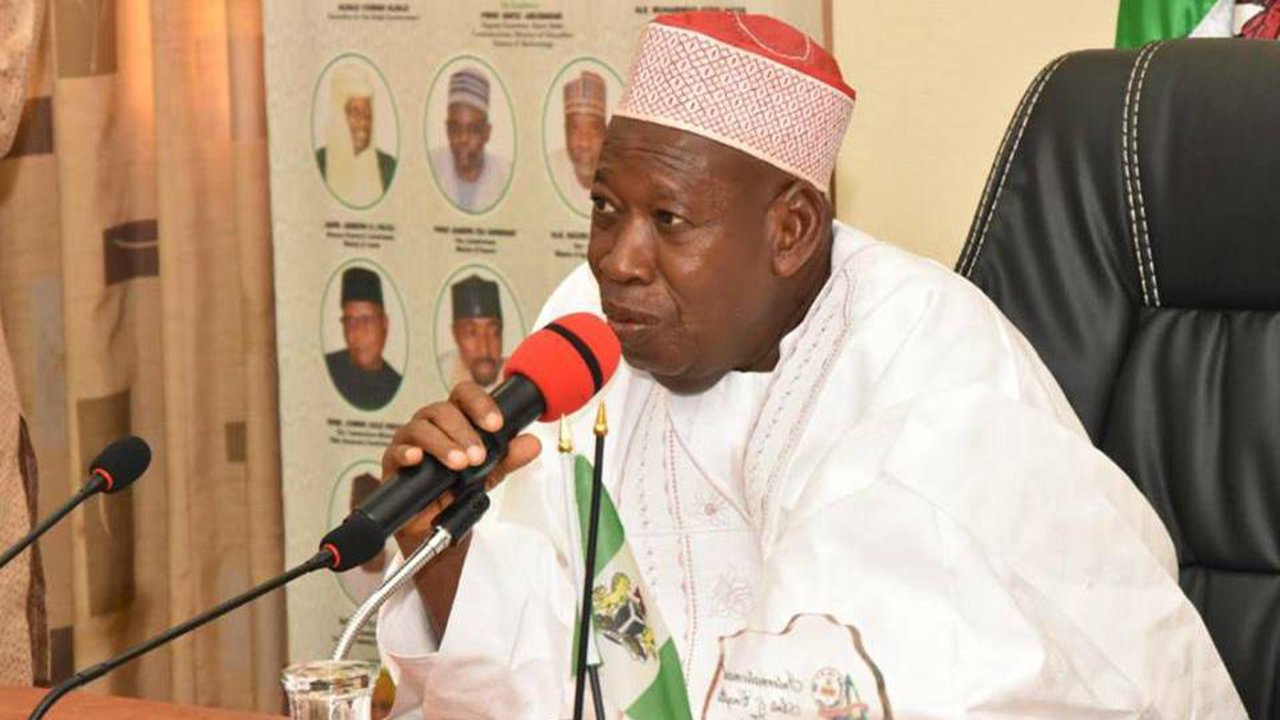A word for ‘Kano Elders’
Following the successful passage of the Executive Bill sent to the Kano State House of Assembly for the creation of four additional emirates, namely; Bichi, Gaya, Karaye and Rano Emirates, which was later assented to by Governor Ganduje, a self-named group Kano Elders under the umbrella of Advocates for United Kano, in a statement signed […]

Kano Governor, Abdullahi Ganduje.
Following the successful passage of the Executive Bill sent to the Kano State House of Assembly for the creation of four additional emirates, namely; Bichi, Gaya, Karaye and Rano Emirates, which was later assented to by Governor Ganduje, a self-named group Kano Elders under the umbrella of Advocates for United Kano, in a statement signed by one Bashir Tofa, called on Governor Abdullahi Umar Ganduje to repeal the law.
The reason being, according to the statement, the umbrella was, perhaps is, concerned ‘about the persistence of Governor Abdullahi Umar Ganduje at the destruction of the emirate, a product of’ their forefathers, ‘which has survived for centuries championing purposeful administration and scholarship in Kano State and beyond.
Ideally, one assumes that the so named Kano Elders were driven by what binds a man to his land that power within that allows one to give up his life to preserve his heritage and the people who worked it. ‘But it is one thing’, they say, ‘to forecast the weather; it’s another to get it right.’
The Kano Elders didn’t not only frown on the law, but also condemned it, accusing the governor of attempting to destroy the 1000-year-old Kano Heritage. Is the emirate 1000-year-old? Has Kano etiquette? If it has what have we done all this while to preserve it?
The statement partly reads: “It is without doubt that the Kano Emirate has, for century, been a formidable force in shaping the character and economic outlook of the Kano society in particular and Nigeria as a whole. Unfortunately, however, the actions of Governor Abdullahi Umar, which, to a greater extent, border on personal margins, are unequivocally bent on destroying that legacy.” The group’s perception of ‘character’, ‘heritage’ and ‘destruction’ inspired this piece.
That Ganduje and Sanusi have locked horns in a ‘battle royale’ or a mortal combat of some kind; or better the governor is exploiting every opportunity at his disposal to politically get even with the Ne Plus Ultra (no more beyond) Sanusi owing to the latter’s connivance with a political party to unseat the former is not the subject matter of this piece. No, a systematic war of attrition is a slippery game and of different dimensions that dies out only if one remains standing.
Things of greater concern to me here are how the group has attempted to re-write history and painted an axe-wielding Ganduje furiously and kinetically hewing the age-long throne and breaching the etiquette of Kano State, turning a blind eye to causalities in one hand and yearnings and aspirations of the people on the other. This is ahistoric, to say the least.
One, it is not true that Kano Emirate is 1000-year-old. The emirate was founded in 1808 or a little earlier – that is 200 years and a little ago. To have a 1000-year-old Kano, one needs to recall Hadejia (Auyo), Dutse and Kazaure, Gumel (which was formally under vessel state of ‘Kanem-Bornu Empire’) Emirates who were for over half a dozen century under Kano Emirate; or simply revert to the Sultanate as ruled by the descendants of Bagauda to preserve 1000-year-old Kano heritage – nothing less.
Two, of course a large portion of the ancient Kano Walls had fallen or been felled for one reason or another and houses as well as commercial buildings have sprung up of a sudden. This attitude of defacing Kano hasn’t spared even the historic monuments within the great Kano Palace.
What we have as the palace today is the remnants of its former self. If the dead familiar with age-long system, for example, were to come back, I am sure they will mistake the palace, especially the practices, for a far-fetched – etiquette, decorum, preservation, whatnot, all gone.
Third, I beg to disagree that the throne upon which Emir Sanusi sits and which the elders seem to be fighting for represents Sokoto Chalphate. In theory? Perhaps, it did, but not does. From January 1, 1900 when Lord Lugard lowered the flag of Royal Niger Company and in its stead hoisted the British Union Jack, specifically 1903 when the British colonial forces captured Kano, a lot have changed. Questions have been raised on the legitimacy of the whole system. All this while, the emirate had never been emasculated, stupefied and desecrated.
Why? “What made it [Sokoto Caliphate] distinct and favoured its success”, wrote Dr Yusuf Bala Usman, “were firstly, the leaders’ commitment to justice, ensured by the law and by economic, social, educational, and cultural development.” Embezzlement, garrulousness and expensive sartorial elegance have never been part of the tradition.
Ahmad Hussain wrote in from Kano.
